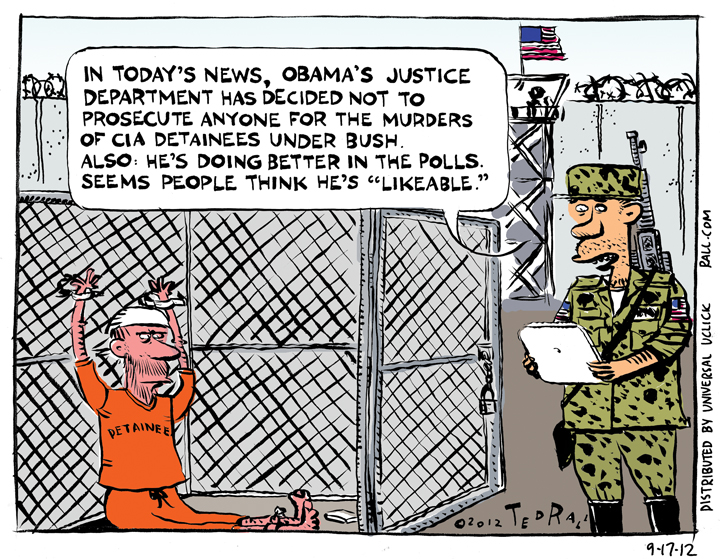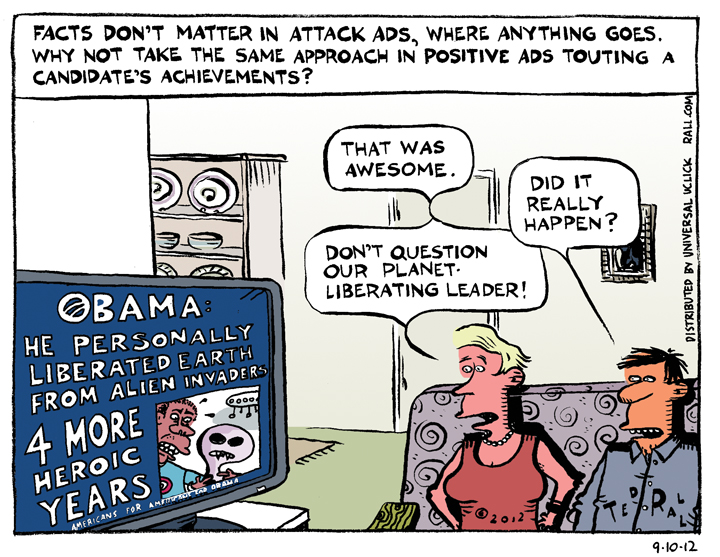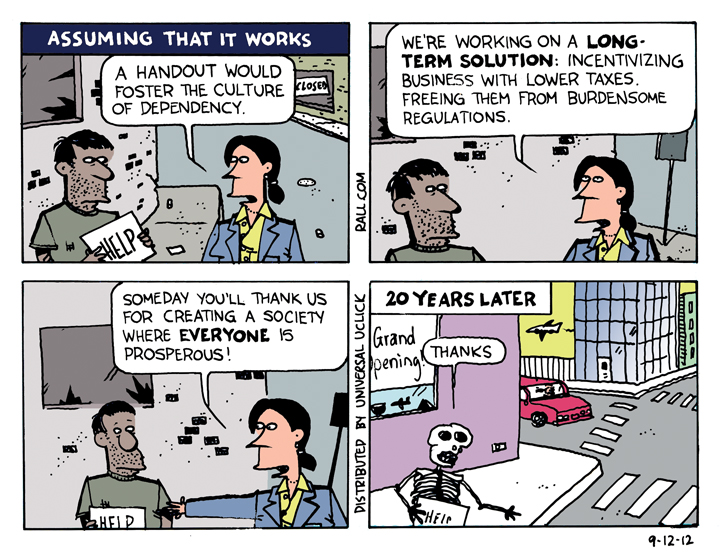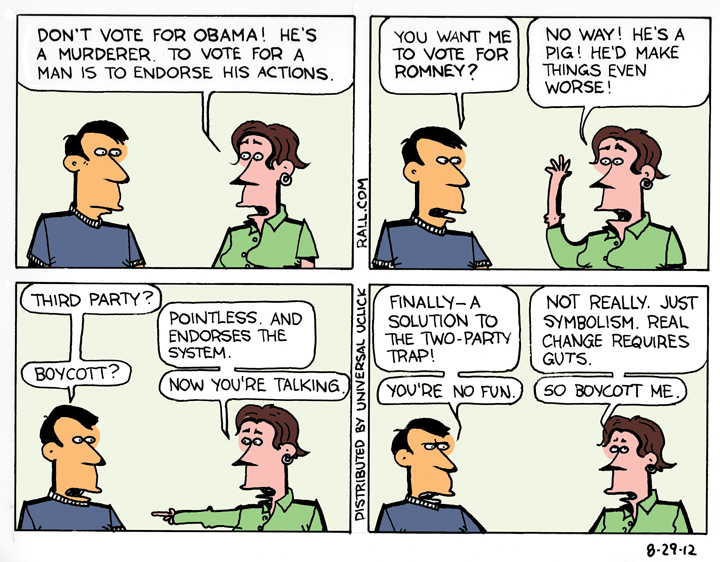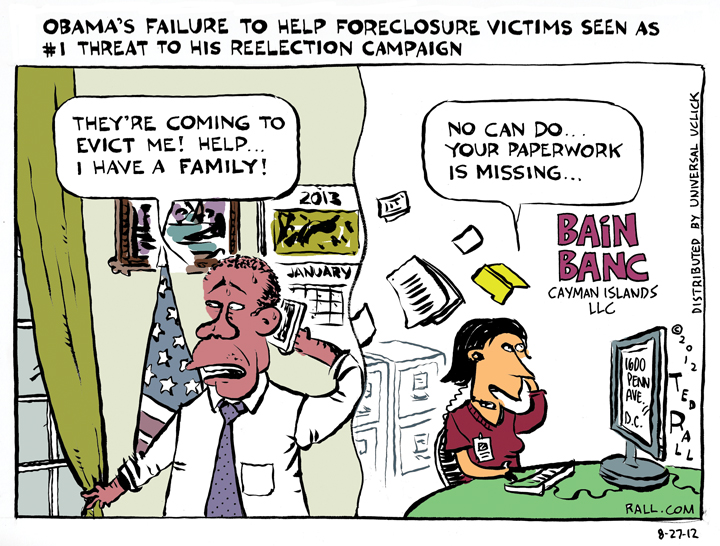Obama’s attorney general announced that the Department of Justice will not prosecute anyone for the murders of CIA detainees during the Bush years in Iraq and Afghanistan. Still, despite this and Guantanamo, most Americans still think Obama is likeableâa key factor in this year’s campaign.
SYNDICATED COLUMN: Pacifist America
Antiwarriors Are Citizens Without a Party
Americans overwhelmingly oppose the wars against Afghanistan and Iraq. Even many veterans say the post-9/11 war on terror was a mistake.
Antiwar sentiment is the majority opinion when it comes to the prospect of future conflicts. Of the two countries the U.S. is currently most likely to attack militarily, nearly seven out of ten people are against invading Syria; even polls that ask leading questions (“do you favor a military strike to prevent Iran from acquiring nuclear weapons?”) find public opinion running opposed to attacking Iran, by 52% to 41%.
Not only are most Americans against wars present and future, we want to slash defense spending in general. According to a National Journal poll, 60% want to cut the Pentagon budget. Thirty-five percent don’t.
Eleven years after America lost the Twin Towers and then its collective mind, something remarkable has happened. We’ve come to our senses.
We’re a nation of pacifists.
So how is a pacifist—in other words, an average American—supposed to vote this fall? Obviously not Republican: Romney says he’ll cut every department except Defense. He wants to spend more on weapons, is open to fighting against Afghanistan and Iraq indefinitely, and is so ignorant that he doesn’t know that the people of Afghanistan are called Afghans.
But with all the veteran and war messaging that went on at last week’s national convention, Democrats look like a mirror image of the GOP: jingoistic, militaristic, and gung-ho for war. Between pogo-dancing on Osama bin Laden’s corpse, the airing of a mawkish “Honoring the Sacred Trust with Our Veterans” video that spread the debunked right-wing myth that returning Vietnam vets got disrespected, the First Lady donning a Dubya-inspired “support our troops” T-shirt, and Democrats’ petty attack on Mitt Romney for omitting to name-check vets in his nomination acceptance address, it felt like the 2002-03 build-up to the invasion of Iraq—except, this time, the president speaks fluent English.
It’s official: the Dems are a war party.
Why the new bellicose tone? In part it’s an attempt to counter the old canard that Democrats are weak on defense, a charge that Republicans used to their electoral advantage throughout the Cold War. As the probably doped Lance Armstrong advised, turn your biggest weakness into your strongest strength. (The Machiavellian Karl Rove, who attacked John Kerry’s war record of all things, put it the other way around: turn their biggest strength into their biggest weakness.) It’s also a reflection of the triumph of Democratic Leadership Council-inspired conservatives, who have cowed, purged and marginalized liberals and pacifists from the party.
Militarism may be unpopular, but it still rules the ruling class. The military-industrial complex enjoys more direct political and economic influence among government officials than ever. The post-9/11 Cult of the Noble Soldier, coupled with the myth of a beleaguered U.S. defending the world from barbarians in an epic clash of civilizations, merely recasts old-fashioned fascist militarism—and it’s just as effective at confusing leftie opponents and putting them off-balance.
Truth be told, the Democrats’ new hawkish tone is catching up with their party’s hawkish history. Ronald Reagan gets credit for the defense build-up of the 1980s that supposedly bankrupted the Soviet Union, but it was Jimmy Carter who started it in 1978. No one remembers now, but “wimpy” Carter also gave us draft registration (in response to the Russian invasion of Afghanistan). Mr. Habitat for Humanity sent arms to the Afghan mujahedeen (some of whom formed Al Qaeda) and provoked the Iran hostage crisis by admitting the recently deposed Shah to the U.S. Bill Clinton launched an optional war of choice against Serbia based on sketchy justifications, and waged an incessant aerial bombing campaign against Iraq that went on so long that the media got bored and stopped covering it, and U.S. pilots ran out of targets.
President Obama may not have been popular with the SEAL team he sent to assassinate bin Laden, but thousands of Pakistanis, Afghans, Yemenis and Somalis victimized by the reign of terror unleashed by his unprecedented, expanded program of drone plane bombings can attest to his credentials as a happy warrior. “Barack Obama,” Aaron David Miller, Middle East policy adviser to Republican and Democratic administrations, wrote recently, “has become George W. Bush on steroids.”
Democrats have always been pro-war. They’d might as well shout it from the rooftops.
Most Americans are against the wars in Iraq and Afghanistan, the cult of militarism and the untouchable status of Pentagon spending on weapons. Yet there is no political home for people who oppose our current wars, or war in general.
Where is a pacifist to go?
(Ted Rall‘s new book is “The Book of Obama: How We Went From Hope and Change to the Age of Revolt.” His website is tedrall.com. This column originally appeared at NBCNews.com’s Lean Forward blog.)
COPYRIGHT 2012 TED RALL
SYNDICATED COLUMN: The Rebranding of the President, 2012
Why Is Obama Running on His Record?
“It’s not clear what [President Obama] is passionate to do if he is elected for another four years,” writes David Brooks, conservative columnist for The New York Times. “The Democratic convention is his best chance to offer an elevator speech, to define America’s most pressing challenge and how he plans to address it.”
Addressing the DNC Wednesday night, Bill Clinton came as close as any Democrat has this year to answering Brooks: “In Tampa, the Republican argument against the president’s reelection was pretty simple: We left him a total mess, he hasn’t finished cleaning it up yet, so fire him and put us back in. I like the argument for President Obama’s reelection a lot better.”
Nicely done—though this argument only works for voters stuck in the two-party trap. But the biggest piece is still MIA: Obama’s domestic and foreign policy agenda for a second term.
Two principal arguments are being advanced in favor of Obama’s reelection: first, that he “took out” Osama bin Laden; second, that we are “absolutely” better off economically than we were four years ago. These arguments, if they continue to be the Democrats’ main talking points, will lead Obama to defeat this fall.
U.S. history shows that the candidate who presents the most optimistic vision of the future usually prevails. The future he sells doesn’t have to be specific (Romney’s 12 million new jobs, say). Ronald Reagan, who projected vague aw-shucks optimism reflected by a 100%-pabulum campaign slogan, “It’s Morning in America,” defeated Jimmy “Malaise” Carter and Walter “Let’s Tell the Truth About Taxes” Mondale. (Never mind that Carter and Mondale were more honest, smarter and nicer.)
Obama followed the Reagan model in 2008: hope, change, charming smile, not a lot of specifics. And it worked. (It didn’t hurt to run against McCain, the consummate “get off my lawn, you damn kids” grouch.) So why is Obama trading in a proven winner? Why is he running on his first-term record?
Obama’s entourage has obviously talked themselves into believing that the president’s record is better than it really is—certainly better than average voters think it is. Grade inflation is inevitable when you evaluate yourself. (In 2009, at the same time the Fed was greasing the banksters with $7.77 trillion of our money—without a dime devoted to a new WPA-style jobs program—he gave himself a B+.)
First, the extrajudicial assassination of bin Laden, an act of vengeance against a man in hiding who had been officially designated to pose no threat since at least 2006, makes some people queasy. Sure, many voters are happy—but getting even for crimes committed more than a decade ago still doesn’t spell out an optimistic vision for the future.
Similarly, and perhaps more potently since jobs are the most important issue to Americans, claiming that we are better off than we were four years ago, either personally, or nationally, is a dangerous argument for this president to make. Four years ago marks the beginning of a financial crisis that continues today. GDP remains a low 1.7%. Credit remains so tight that it’s still strangling spending.
Four million families lost their homes to foreclosure, millions more were evicted due to nonpayment of rent, and a net 8 million lost their jobs under Obama. Structural unemployment is rising. New jobs are few and pay little.
Most Americans—by a nearly two-to-one margin—feel worse off now than they did four years ago. Coupled with the media’s ludicrous claim that the recovery began in mid-2009, Obama’s “who are you going to believe, me or your lying eyes” (or pocketbook) sales pitch is so insulting and reminiscent of George H.W. Bush’s tone-deaf attitude during the 1992 recession that it can only prove counterproductive.
The historical lesson for Obama is 1936. Franklin Roosevelt is the only president in recent history to have won reelection with unemployment over 8%, as it is currently (it was 17%). Why? FDR’s New Deal showed he was trying hard. And things were moving in the right direction (unemployment was 22% when he took office). Fairly or not, Obama can’t beat Romney pointing to improvement statistics don’t show and people don’t feel.
Obama must articulate a new vision, relaunching and rebranding himself into something completely different—in other words, running as though the last three four years had never happened. Like this was his first term.
New image. New ideas. New policies. New campaign slogan.
Not only does Obama need to float big new ideas, he needs to convince voters that he can get them through a GOP Congress. Not an easy task—but there’s no other way.
It isn’t enough to simply say that Romney will make things worse. Lesser-evil arguments are secondary at best. As things stand now, with people angry and disappointed at government inaction on the economy, Romney’s “Believe in America” meme—though stupid—is more potent than Obama’s reliance on fear of a Ryan budget.
(Ted Rall’s new book is “The Book of Obama: How We Went From Hope and Change to the Age of Revolt.” His website is tedrall.com. This column originally appeared at NBCNews.com’s Lean Forward blog.)
COPYRIGHT 2012 TED RALL
SYNDICATED COLUMN: Four Bore Years
The Second-Term Curse Belies Obama’s Optimistic Vision
Breaking news: Obama willing to compromise!
Everybody (<—translation: media types) is talking about an interview in which the President makes his case for reelection. A second term, he argues, would end the current gridlock between the Democratic White House and Republican Congress, leading to some sort of grand bargain–or at least a deal–that would improve the crappy economy.
Here’s the money quote:
“What I’m offering the American people is a balanced approach that the majority agrees with, including a lot of Republicans. And for me to be able to say to the Republicans, the election is over; you no longer need to be focused on trying to beat me; what you need to be focused on and what you should have been focused on from the start is how do we advance the American economy. I’m prepared to make a whole range of compromises, some of which I get criticized from the Democratic Party on, in order to make progress.”
Liberal commentators scoffed (though more in sorrow than in anger), pointing out that Republicans who blocked Obama’s slightly-left-of-Milton-Friedman agenda throughout his first term aren’t going more likely to compromise during his lame-duck second term. Furthermore, Obama is wrong about GOP tactics changing once he hits his constitutional term limit. Nasty–and effective–attack ads aside, it really isn’t personal for them. Republican strategists will work to defeat whoever wins the Democratic nomination for president in 2016 just as hard as they schemed to stymie Obama. Which is, of course, exactly what an opposition party should be expected to do.
Unless they’re Democrats. But I digress.
I couldn’t help noticing two remarkable aspects to Obama’s statement:
First, it tacitly admits that he didn’t get much done on jobs, unemployment and the economy–the issue that has consistently ranked as the voters’ top concern the entire time he’s been president. This is a dangerous gambit. Blaming the other party for leaving a mess and for obstructionism has a poor record of electoral success, particularly on the economy; fair or not, voters tend to hold sitting presidents responsible for the state of their wallets.
Second, it asks us to assume that a president’s second term is an opportunity. In fact, history suggests anything but. The vast majority of the signature legislative and policy achievements by U.S. presidents occurred at the beginning of their first terms: FDR’s first 100 days, LBJ’s civil rights act and his war on poverty, Reagan’s partial dismantling of the aforementioned social safety net. Though slow out of the gate, George W. Bush got a reset in the form of 9/11, which he used to push through all sorts of mayhem: the Patriot Act, legalized torture, and a pair of ridiculous optional wars.
The record of non-achievement of second terms is so grim that you have to wonder why presidents ever run for reelection. Whether you look at Richard Nixon, who won a record 1972 landslide only to resign two years later, or Bill Clinton’s second term, when he was caught in the mire of the Travelgate and Monica Lewinsky scandals, or Ronald Reagan’s second term, which was dominated by Iran-Contra and hobbled by the early onset of Alzheimer’s, it is hard to think a president who got much done during his second term. Look at George W. Bush’s number two: he wanted to privatize Social Security and expand the GOP into a permanent majority party; instead, his popularity sank like a stone.
Why do these guys want a do-over so badly? Must be the free food and rent.
Whether Obama is aware of presidential history or just blowing smoke, you shouldn’t expect much from a second term. If you’re voting for Obama simply to keep Romney out–to deny him a chance to get anything done–that’s fine. But don’t expect Obama to get a liberal agenda–assuming he ever wanted one–through Congress. That ship sailed after the 2010 midterm elections.
Or a grand bargain. That boat was never built.
There are a couple of things Obama could do to mitigate the second-term curse. He could take his case directly to the American people, asking the citizens to pressure the Republican-dominated Congress to push through popular agenda items like forcing banks to write down principal on homes that have lost value since the burst of the housing bubble, tax subsidies for college tuition, and extending benefits to the majority of unemployed Americans, who no longer receive any. Democrats have forgotten this approach: Obama has failed to rally his supporters, Bill Clinton, another man who put too much faith inside the Beltway, had the same failing.
Another way Obama and the Democrats could make the most of a second term would be to replicate what the Republicans did with Newt Gingrich’s 1994 Contract with America, in other words, to state a list of policies and new laws that voters would effectively be endorsing if Obama wins. After November, Democrats would then be able to argue that they have a direct mandate for their agenda.
(Ted Rall’s new book is “The Book of Obama: How We Went From Hope and Change to the Age of Revolt.” His website is tedrall.com. This column originally appeared at NBCNews.com’s Lean Forward blog.)
COPYRIGHT 2012 TED RALL
Help!
Obama tried to finesse his response to the housing crash, rejecting a bailout of homeowners facing foreclosure in favor of a limited aid program and a bet that a recovering economy would take care of the rest. Millions of people lost their homes and the recovery never materialized. The economy is now the primary threat to Mr. Obamaâs bid for a second term, and economists and political allies say the Obama’s non-response to the housing crisis was the administrationâs most significant mistake.
SYNDICATED COLUMN: Lead, or Follow and Get Out of the Race
Voters Turn Against Pols’ Follow-the-Polls Strategy
In order to be a good leader, Disraeli said, “I must follow the people.”
Aided and abetted by toe-sucking pollster Dick Morris, Bill Clinton finessed the art of leading from the rear, relying on Morris’ tracking surveys to help him decide everything from whether to bomb Serbia to when and if to take a vacation.
By definition, however, leaders point where their followers should go. Americans haven’t seen much real leadership on the federal level since Reagan. Where there’s been progress, such as on gay rights, the President only stepped forward after public opinion had shifted enough to make it safe.
For the first time in 30 years, Dick Morris’ follow-the-voters strategy appears to be running out of steam. This year, the electorate seems to be hungering for presidents in the mold of TR, FDR and LBJ—old-school leaders who painted ambitious visions of where America could go and why it should, who took political gambles that the people might not be ready for what they had in mind, who anticipated crises and challenges before anyone else, and explained why we had to act sooner rather than later.
The craving for leadership is evident in the polls. Though personally popular and enjoying the advantages of incumbency, President Obama is running neck and neck against Mitt Romney, an awkward candidate from a minority religion who has trouble connecting with, and is seen as out of touch by, ordinary voters.
Democrats must be worried. Historically, Republican presidential nominees typically gain on Democrats throughout the fall. At this point in the game, Democrats need a substantial lead in order to emerge victorious in November.
What’s going wrong? Mainly, it’s the economy. It sucks. Still. Democrats say the President inherited the meltdown from Bush. But Americans blame Obama.
“The nation’s painfully slow pace of growth is now the primary threat to Mr. Obama’s bid for a second term, and some economists and political allies say the cautious response to the housing crisis was the administration’s most significant mistake,” reports The New York Times. Obama’s big screw-up: “He tried to finesse the cleanup of the housing crash, rejecting unpopular proposals for a broad bailout of homeowners facing foreclosure in favor of a limited aid program—and a bet that a recovering economy would take care of the rest.”
Recovery? What recovery?
The depressed housing market, coupled with the reduced purchasing power of tens of millions of Americans who lost their homes to eviction and/or foreclosure, makes recovery unlikely to impossible for the foreseeable future.
Many people, including yours truly, warned that the millions of Americans who were evicted under foreclosure, many of them illegally, were more “too big to fail” than Citigroup. Some, like former Congressman Jim Marshall (D-GA), voted for TARP, but urged the Obama Administration to condition the bailout on forcing the banks to refinance mortgages and write down principal to reflect the new reality of lower housing prices. “There was another way to deal with this, and that is what I supported: forcing the banks to deal with this. It would have been better for the economy and lots of different neighborhoods and people owning houses in those neighborhoods,” Marshall says.
Voters aren’t mad at Obama for not being clairvoyant. They’re pissed off because he ignored people who were smart and prescient in favor of those who were clueless and self-interested, like Tim Geitner. He may be about to pay a price for that terrible decision.
Tens of millions of Americans already have.
Speaking of leadership—the art of seeing what comes next and doing something about it—what looming problems are the political class ignoring today?
It’s too late to stop the 2008-to-2012 economic meltdown. But it’s still possible for Obama (or, theoretically, Romney) to get ahead of the economy—permanent unemployment benefits, anybody?—and other pressing issues.
Australia, for example, is taking the climate change crisis seriously.
Americans want leaders who point the way forward, to anticipate monsters we can’t yet imagine. For example, there is a huge looming crisis: pensions. In 10 to 15 years, Generation Xers will hit traditional retirement age. How will they eat?
Close to none have traditional defined-benefit pension plans. Gen Xers, who earn far less than the Baby Boomers at the same age, have been shunted into 401(k)s, which turned out to be a total ripoff: the average rate of return between 1999 and 2010 was 0.3 percent.
Total.
And much of that was withdrawn—under penalty—to subsist after layoffs.
“[Gen Xers] have no savings, and what they had was devastated by two market crashes,” said Andrew Eschtruth of the Center for Retirement Research. “They never got off the ground.”
If you’re 45 years old now and just beginning to save for retirement, financial planners say you should save 41 percent of your income annually (if you haven’t gotten laid off again). As if. Half of Gen Xers live hand to mouth; the rest save a piddling six percent a year.
The Gen X retirement crisis represents 46 million people waiting for a savior—and 46 million potential votes.
Attention Mssrs. Obama, Romney and anyone else presenting yourself as a would-be leader: Don’t just read the polls. Don’t follow us. Show that you care about, and have a credible plan to confront, the problems of the future. If you do that—and we’re not holding our breaths—we’ll pay attention to you.
(Ted Rall’s new book is “The Book of Obama: How We Went From Hope and Change to the Age of Revolt.” His website is tedrall.com. This column originally appeared at NBCNews.com’s Lean Forward blog.)
COPYRIGHT 2012 TED RALL

